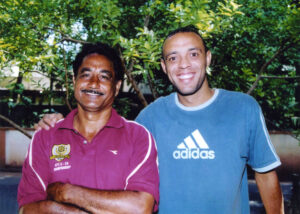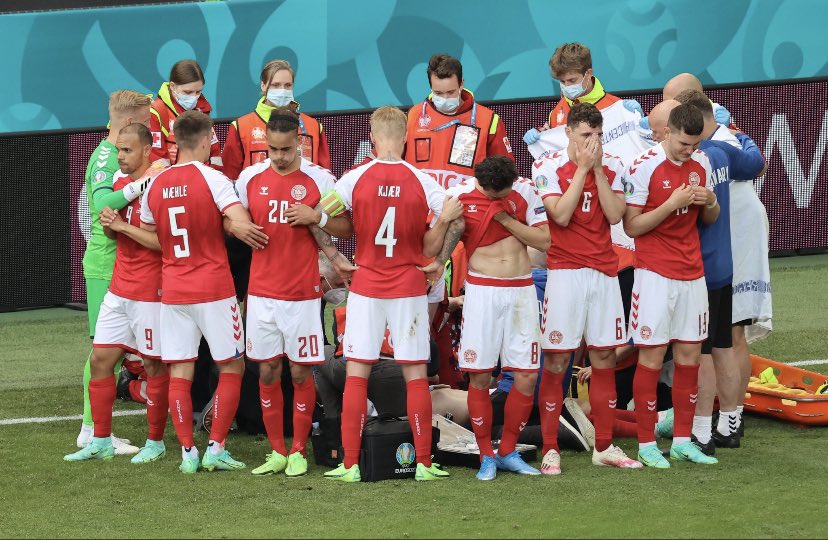Christian Eriksen’s collapse on the field towards the end of the first half of Denmark’s opening Euro 2020 clash against Finland on Saturday wasn’t the first for world football. It won’t be the last either.
The star midfielder needed 13 minutes of CPR from the medical staff at the stadium before being revived. In the words of Denmark’s team doctor Morten Boesen, “he was gone”.
Eriksen is lucky to be alive.
Ask the families of Marc Vivien Foe (Cameroon), Dani Puerta (Spain), and Bruno Boban (Croatia), all of whom lost their lives on the field. All three died of cardiac arrest. In the case of Foe, a Cameroon international who breathed his last during the Confederation Cup semi-finals against Colombia in 2003, even CPR from expert doctors failed to revive him.
“I couldn’t bear to see Eriksen collapsing. It was scary. Till the time it was announced that Eriksen is stable at the hospital and the match resumed, it was traumatic for me,” said former India coach Armando Colaco.

Colaco’s trauma is understandable. On December 5, 2004, when as Dempo Sports Club coach he was on the verge of winning his first major trophy with the club, tragedy struck at the Sree Kanteerava stadium in Bengaluru.
Playing the Federation Cup final against Mohun Bagan, Dempo’s
Brazilian striker Cristiano Junior clashed with the rival goalkeeper in the 78th minute and collapsed. He was declared dead at the hospital with “cardiac arrest” given as the reason for his death.
Junior scored both goals in Dempo’s 2-0 triumph over Bagan in the final.
“The Eriksen incident brought back those dark memories from 2004 when we saw one of our own die on the field. Top-class medical facilities at Euro 2020 saved the Denmark midfielder,” said Samir Naik, who captained Dempo at the Federation Cup.
Since Junior’s death 17 years ago in Bengaluru, a lot has changed for Indian football.
The All India Football Federation (AIFF) soon made it mandatory for clubs to register a doctor or physiotherapist, a welcome change from the days when it was the sole responsibility of local organisers to arrange for a doctor and ambulance during games.
According to the latest Indian Club Licensing Regulations, professional clubs must appoint a medical doctor (at least one) and physiotherapists (at least two) to fulfill the Grade A criteria for club licensing.
Even for tournaments and leagues, the availability of an ambulance with advanced life support, staffed by at least one paramedic, is a must.
“The local organising committee (LOC) shall have a medical team, headed by a qualified doctor for first aid and other emergency duty during the matches. The medical team shall be equipped for emergencies and there shall be two ambulances at the venue. Both of the ambulances shall be fully equipped with emergency equipment, including defibrillator,” states Article 46 of regulations for I-League, Indian football’s second-tier club competition, behind the cash-rich Indian Super League.
The rules also state that an Automated External Defibrillator (AED) must be placed next to the fourth official-reserve referee — seat or the medical bench.
Professional clubs are also mandated to conduct Pre Competition Medical Assessment (PCMA) of all players. This allows identification of asymptomatic athletes who have potentially risk of sudden cardiovascular death (SCD) through restriction from competitive sports.
Anwar Ali, who played every minute of India’s campaign at the FIFA U-17 World Cup in 2017, is a classic example of how players with health risk are identified and stopped from playing competitive football. They can only pursue the sport for leisure.
“Football is a high-pressure contact sport. The stakes are high, and anything can happen on the field. It’s imperative that all safety measures are in place. Clubs should also take this seriously,” said Colaco, India’s most successful coach in recent times having guided Dempo to a record five national league titles.
When Colaco was invited by FC Goa coach Zico in 2014 to watch a team training session at the Tilak Maidan in Vasco, he was pleasantly surprised that the Brazilian delayed start till an ambulance and paramedic had arrived.
“Zico knows that in football nothing can be left to chance, whether we are playing a competitive game or training. Indian football needs such a mentality,” Colaco said.
Edited by: Aparna Nair

